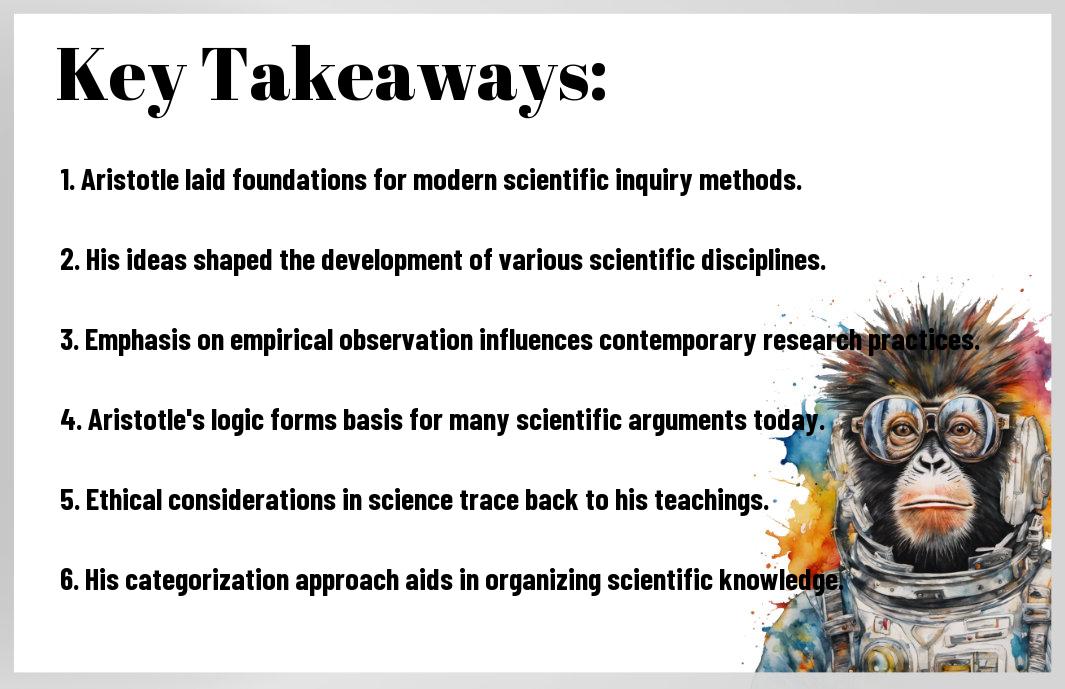Influence is a powerful force, and when I think about the lasting impact of Aristotle, I can’t help but marvel at how his ideas shape our understanding of the world today. As one of the founders of scientific thought, Aristotle laid the groundwork for various fields, from biology to ethics. In this blog post, I will explore how his timeless principles continue to resonate and guide our quest for knowledge in the modern era. Join me as we unpack the remarkable legacy of this great philosopher!
Key Takeaways:
- Philosophy: Aristotle’s profound contributions continue to shape modern philosophical discourse, influencing fields such as ethics, metaphysics, and political theory.
- Scientific Method: His emphasis on empirical observation and systematic experimentation set the groundwork for the scientific method used today.
- Biology: Aristotle’s classification of living organisms laid the foundation for modern biology, impacting taxonomy and ecological studies.
- Logic: His development of formal logic remains integral to contemporary reasoning, argumentation, and analytical methodologies in various disciplines.
- Rhetoric: Aristotle’s work on rhetoric informs current approaches to communication, persuasion, and public speaking across numerous fields.
- Political Science: His analyses of governance and civic ethics influence today’s political theory and practice, guiding modern democratic principles.
- Education: Aristotle’s views on education and learning emphasize the importance of critical thinking and moral development, shaping contemporary educational philosophies.

The Father of Science – Aristotle’s Impact Today
A Quick Biography
Aristotle was a remarkable figure in Western philosophy and science, born in 384 BCE in Stagira, a small town in northern Greece. His journey began when he became a student at Plato’s Academy in Athens, where he nurtured a profound love for knowledge and inquiry. After Plato’s passing, Aristotle ventured out to explore different philosophical and scientific avenues, eventually founding his own school, the Lyceum, which became a center for learning and debate. He spent years studying various subjects, ranging from biology and physics to ethics and politics, shaping his understanding of the world around him.
During his lifetime, Aristotle’s influence expanded beyond philosophy; his teachings and concepts laid the groundwork for various fields, including biology, physics, and logic. He passed away in 322 BCE, but his legacy has continued to permeate through the centuries, affecting how we perceive and investigate the natural world today. You might find it fascinating how much of what Aristotle documented in his works still resonates within modern thought, showcasing the depth of his understanding and the timeliness of his ideas.
His Major Works
Around the 4th century BCE, Aristotle authored numerous texts that explored diverse topics and disciplines. Some of his most influential works include “Nicomachean Ethics,” “Politics,” “Metaphysics,” and “Poetics.” Each of these texts reflects his holistic approach to knowledge, interweaving ethics, politics, and art with scientific observations. The depth and breadth of his writing demonstrate a commitment to understanding not only the physical world but also human relationships and moral reasoning.
Due to the comprehensive nature of Aristotle’s writings, his works serve as a foundational source for many academic disciplines today. Scholars still refer to his ideas when discussing ethics, logic, biology, and other scientific concepts. The way he approached observation and inquiry laid necessary groundwork for the scientific method, and his ability to categorize knowledge has influenced countless thinkers over the years. It’s quite inspiring to see how Aristotle’s intellectual pursuits still encourage us to question, explore, and learn about our world today.

The Legacy of Aristotle
If there is one figure from the ancient world whose influence remains palpable today, it is Aristotle. His contributions spanned multiple fields, but perhaps most notably, he laid the foundations of logic and reasoning, which we still actively employ in our daily lives. When I think about how we approach problem-solving and decision-making, I can’t help but appreciate how his systematic methodology continues to guide our thinking, whether in academic settings or through practical applications in various industries. His work in establishing formal logic has allowed us to cultivate a structured approach to knowledge that helps us differentiate between valid arguments and mere opinions.
Logic and Reasoning
Below the surface of everyday communication lies the wealth of knowledge Aristotle provided regarding logical reasoning. His emphasis on syllogisms and the structure of arguments encourages us to scrutinize our beliefs and challenge assumptions. This method of rigorous analysis is something I find incredibly beneficial when engaging in discussions or debates. I often reflect on Aristotle’s principles when I’m faced with a complex problem; they guide me in constructing clear and coherent arguments, making sure I base my conclusions on logical premises.
Ethics and Morality
Around the world today, Aristotle’s thoughts on ethics and morality deeply inform our understanding of what it means to live a good life. His concept of virtue ethics resonates with me, as it encourages the development of personal character over mere adherence to rules. In a society that often seems polarized, I find value in his idea that moral virtue lies in finding a balance—what he referred to as the “golden mean.” This approach allows me to navigate complex moral dilemmas with a sense of purpose and clarity, reflecting on how my actions contribute to my character and the well-being of others.
The relevance of Aristotle’s ethical framework in contemporary society can be seen in discussions around moral philosophy, responsibility, and community. As we face new challenges today—from social justice to environmental sustainability—I believe Aristotle’s emphasis on virtues, empathy, and the common good is more significant than ever. By fostering these characteristics in ourselves, we not only strive for personal betterment but also contribute to a more harmonious society. Embracing his ideals helps me navigate my moral journey with mindfulness and intention.
Aristotle’s Influence on Science
Once again, I find myself reflecting on how Aristotle’s ideas have shaped the very foundations of science as we know it today. It’s fascinating to think about how this ancient philosopher’s curiosity and observations laid the groundwork for countless fields of study. His methodologies might seem simple by today’s standards, yet they were revolutionary in promoting a systematic approach to understanding the world around us. I truly believe that without his contributions, we might not have made the same progress in various scientific domains that we enjoy now.
As I dive deeper into Aristotle’s influence, I consider the tangible frameworks he established that continue to guide scientific inquiry. His commitment to observation and classification can be seen in fields like biology, physics, and even medicine. The way he encouraged a systematic study of nature led to the birth of disciplines that have proven invaluable to human advancement. By grounding science in empirical evidence rather than sheer speculation, Aristotle initiated a legacy that resonates to this day.
Natural Sciences
The natural sciences owe a significant debt to Aristotle, who was among the first to categorize and analyze the natural world systematically. His work in biology, particularly, fascinates me; he famously classified living organisms, laying the groundwork for modern taxonomy. You can see his influence in how we study and understand ecosystems and biological classifications today. The empirical methods he advocated for—observing, hypothesizing, and testing—remain fundamental in our scientific practices. I think about how remarkable it is that his early work still pertains to our modern biological sciences, demonstrating the lasting power of his ideas.
Moreover, Aristotle’s contributions to physics and astronomy also laid the background for future exploration and discovery. Just as he scrutinized the natural movements of celestial bodies and earthly phenomena, I see echoes of his methods in the rigorous experiments conducted in labs around the world. His insistence on rational explanation and inquiry allowed us to launch on our scientific journey, demonstrating the relevance of his thoughts in explaining nature’s principles. It’s almost as if I can trace a thread from his ancient musings directly to today’s scientific accomplishments.
Social Sciences
Influence from Aristotle extends beyond the natural sciences and investigates deep into the social sciences. His exploration of ethics, politics, and human behavior has sparked countless debates and discussions that are still pertinent in today’s societal frameworks. Just think about it: we often analyze social structures, moral philosophies, and political systems through a lens that reflects his foundational thoughts. Asking questions about human nature and society’s moral compass has been a continuous journey right from Aristotle’s time to ours.
Natural observations in social sciences have benefited immensely from Aristotle’s work, shaping how we view interactions within societies. His inquiries into human behavior, virtue, friendships, and governance offer a rich tapestry that enables us to understand current societal dynamics better. When I engage with topics pertaining to ethics or community, it feels like I am engaging in a conversation that began with him. His insights provided the initial steps towards rational discourse about society, and exploring these topics today feels like an intellectual lineage that I actively participate in. Each discussion brings Aristotle’s thoughts back into the limelight, reflecting the lasting nature of his influence in our lives.
Aristotle in Philosophy
Unlike many philosophers who followed after him, Aristotle’s approach was grounded in observation and experience, making his work more accessible and practical. He didn’t just contemplate abstract ideas; instead, he examined the world around him and encouraged us to do the same. His way of thinking laid the foundation for numerous branches of philosophy, allowing us to understand various aspects of life, ethics, and human nature better. Whether you’re pondering a deep question about existence or navigating a daily dilemma, Aristotle’s insights can guide you on your journey.
Metaphysics and Epistemology
Beside his exploration of the physical world, Aristotle’s contributions to metaphysics and epistemology are even more significant today. He introduced concepts like substance and essence, prompting us to think about what it means for something to exist. When you examine these discussions, you’ll find that they inspire modern debates on reality and knowledge, prompting you to reflect on what you truly know and how you gather that knowledge.
Political Philosophy
Across the spectrum of human thought, Aristotle’s political philosophy offers timeless insights that still resonate in contemporary discussions about governance and society. He believed that the state exists not just to preserve life but to promote the good life. This perspective invites you to consider not only the structure of your government but also the type of life you want to lead within it. His ideas on citizenship and civic participation push us to evaluate our role within our communities and the larger society.
For instance, Aristotle’s notion of the “best” government invites us to evaluate our own political systems critically. He argued that a government should actively promote the flourishing of its citizens, fostering a sense of community and shared purpose. As I think about today’s political climate, his advocacy for a balanced government that incorporates elements of democracy, aristocracy, and monarchy challenges us to consider how we can create structures that best support our collective well-being. By reflecting on Aristotle’s ideas, I find myself inspired to engage more actively in discussions about governance and civic responsibility.
Modern Applications of Aristotle’s Ideas
Education and Teaching
One of the areas where I see Aristotle’s influence today is in education and teaching methodologies. His emphasis on critical thinking and active inquiry continues to resonate in modern classrooms. By encouraging students to question, analyze, and engage with material, educators can cultivate a love for learning that Aristotle championed. I aim to incorporate his principles into my teaching style, fostering an environment where students feel empowered to explore their ideas and engage in thoughtful discussion.
Additionally, Aristotle’s concept of virtue ethics, which focuses on character and the development of good habits, has become a significant part of contemporary educational philosophies. I find that integrating these ideas into my curriculum not only enriches the learning experience but also promotes personal growth and ethical decision-making among my students. Together, we can explore historical philosophies and apply them to our everyday lives, bringing Aristotle’s wisdom into the present day.
The Relevance of Aristotelian Ethics
Teaching Aristotle’s ethical framework has become increasingly relevant in a world filled with moral dilemmas. His focus on virtue and the quest for a balanced life encourages us to consider our actions thoughtfully. By applying Aristotle’s teachings on ethics in our own lives, I’m often challenged to reflect on my values and strive for personal improvement. This reflective practice not only helps me but also guides my students as they navigate the complexities of modern society.
In addition, Aristotle’s idea of the “Golden Mean” invites us to strike a balance in our ethical pursuits, promoting moderation in all aspects of life. I find that this concept resonates deeply in discussions around contemporary issues, from leadership practices to personal relationships. By encouraging my students to embody these principles, we can develop a more compassionate and ethical society, proving that Aristotle’s insights are not just theoretical but profoundly applicable in our daily lives.

Criticism and Reevaluation
After centuries of being lauded as the father of science, Aristotle’s work has undergone significant scrutiny and reevaluation. While his contributions laid the groundwork for various fields of study, modern scientists and philosophers often reassess his theories in light of new evidence and ideas. This critical eye helps us understand not only where his insights were revolutionary but also where they may have fallen short compared to contemporary knowledge. As we uncover these layers, it’s necessary to appreciate both the value and limitations of Aristotle’s impact on today’s scientific landscape.
Misconceptions About Aristotle
About Aristotle, I often find that many people assume he strictly adhered to the scientific method as we know it today. This is a common misconception. While he indeed emphasized observation and logical reasoning, his theories were also steeped in the philosophical context of his time, which was less empirical than what we practice now. You might think of him as a figure who was purely scientific, but it’s important to recognize that he also blended metaphysics and ethics into his explorations, making his approach more holistic and, at times, less rigorous by today’s standards.
Contemporary Perspectives
Behind the curtains of modern scientific exploration lies a thoughtful re-examination of Aristotle’s ideas. Scholars today often reflect on how his classifications and categorizations influenced the foundational principles of biology and physics. I have found that engaging with contemporary perspectives can enrich our understanding of his legacy; it reveals a multidimensional thinker who wasn’t afraid to challenge the notions of his era. You might be surprised to learn that many of his ideas, particularly about natural philosophy, continue to resonate and provoke reflection in modern discussions about science and ethics.
Misconceptions about Aristotle can sometimes overshadow his genuine contributions. This reevaluation opens up a conversation about how we, as thinkers and learners, can appreciate Aristotle in a more nuanced way. It’s fascinating to observe that modern science has evolved past some of his conclusions, yet the methods of inquiry he fostered remain relevant. This balance between critique and appreciation allows us to grasp the enduring influence of Aristotle’s work, while also recognizing how far we’ve come in our understanding of the world around us.
Final Words
As a reminder, Aristotle’s contributions have shaped not just philosophy, but the very foundations of science, ethics, and logic that we engage with in our daily lives. I often find myself reflecting on how his ideas continue to influence our understanding of the world around us. From scientific inquiry to ethical considerations, the principles he established serve as a guiding light for many of us seeking knowledge. If you’re curious about delving deeper, I recommend checking out the Aristotle | Internet Encyclopedia of Philosophy, which provides informative insights into his thoughts and relevance in contemporary discussions.
In today’s fast-paced world, I believe it’s vital to acknowledge the wisdom of ancient thinkers like Aristotle. He challenged us to ask questions and seek evidence, ideas that ring as true now as they did over two millennia ago. I hope that as you navigate your own journey of learning, you find inspiration in his teachings, just as I have. By embracing the quest for knowledge and understanding, we honor his legacy and keep the spirit of inquiry alive.
FAQ
Q: Who was Aristotle and why is he referred to as the Father of Science?
A: Aristotle was an ancient Greek philosopher and scientist who lived from 384 to 322 BC. He is considered the Father of Science due to his extensive contributions to numerous fields such as biology, physics, ethics, politics, and logic. His empirical approach and systematic observations laid the groundwork for scientific methodology, prioritizing evidence and testable theories.
Q: How did Aristotle influence the scientific method used today?
A: Aristotle’s emphasis on observation and classification inspired the modern scientific method. He advocated for empirical evidence as a basis for knowledge, which is foundational in contemporary science. His techniques of gathering data, forming hypotheses, and drawing conclusions have greatly shaped current research practices.
Q: In what ways did Aristotle contribute to the field of biology?
A: Aristotle made significant advancements in biology by categorizing animals and plants based on their characteristics and behaviors. He conducted detailed studies of marine life and terrestrial organisms, establishing early principles of natural history and taxonomy, which have evolved into the classifications we rely on today.
Q: How does Aristotle’s philosophy affect modern ethical theories?
A: Aristotle’s ethical philosophy, particularly his concept of virtue ethics, continues to be influential. His ideas about the importance of character and the pursuit of the ‘good life’ resonate in modern ethical discussions, emphasizing the development of personal virtues and moral character rather than solely focusing on rules or consequences.
Q: What relevance does Aristotle’s logic have in contemporary education and reasoned debate?
A: Aristotle’s work in logic, particularly the syllogism, laid the foundation for formal reasoning and critical thinking. His principles are integrated into educational curricula, fostering analytical skills and structured approaches to argumentation that remain imperative in academic and professional settings today.
Q: How has Aristotle’s work impacted advancements in political theory?
A: Aristotle’s exploration of politics, especially his views on governance and citizenship, has profoundly influenced political theory. His analysis of different political systems, the concept of the ‘best state,’ and the role of citizens in political life are still referenced in contemporary discussions about democracy, governance, and civic responsibilities.
Q: What can modern society learn from Aristotle’s ideas on happiness and human fulfillment?
A: Aristotle believed that happiness (eudaimonia) is achieved through virtuous living and the realization of one’s potential. Modern society can glean that genuine fulfillment comes from balancing material success with personal growth, ethical conduct, and meaningful relationships, leading to a more holistic approach to well-being and happiness.



